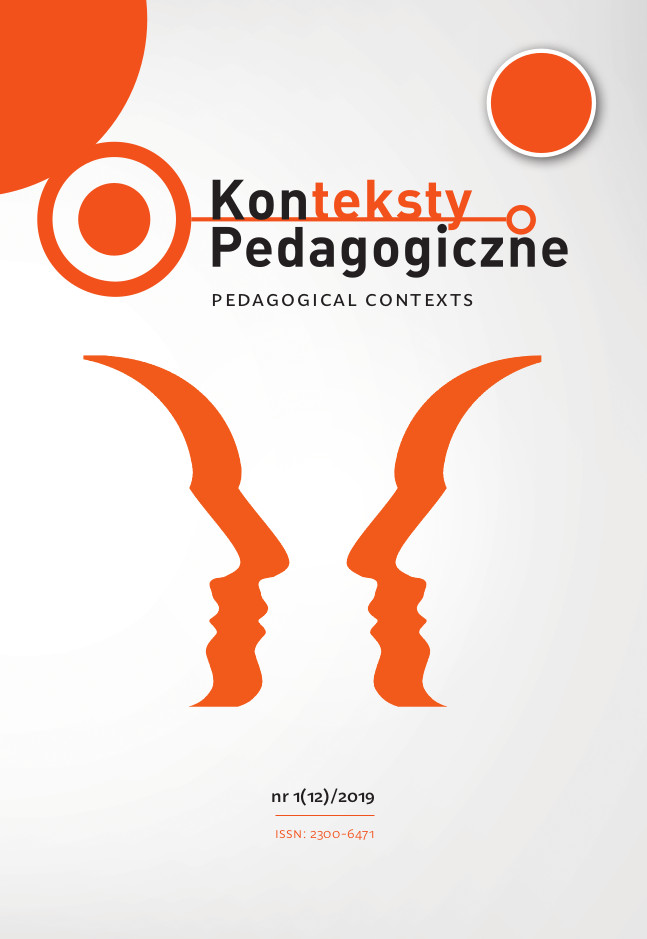Abstract
The article analyses issues connected with the educational methods, forms of class organization as well as teaching aids applied by teachers of early childhood education. It also evaluates the effectiveness of the above-mentioned factors since, to a large extent, they determine the success of educational process. The article aims at examining the content related to the aforementioned issues based on the research conducted in 2016 among 200 early childhood education teachers from Poland (Tarnów and the Tarnów district) and 200 teachers from Hungary (Kaposvári, Sárospatak).
References
A kisgyermekkori nevelés és gondozás irányelvei – Magyarországi Országjelentés [Early Childhood Education and Care Policy. Country Report for Hungary] (2005). Szerk. OECD Oktatási Igazgatóság. Budapest: OKI, NCSSZI, Corvinus Kiadó.
Berács, J., Derényi, A., Kováts, G., Polónyi, I. and Temesi, J. (2015). Stratégiai helyzetértékelés [Hungarian Higher Education 2014 – Strategic Analysis]. Budapest: Budapesti Corvinus Egyetem Nemzetköz, Felsőoktatási Kutatások Központja.
Fechner-Sędzicka, I., Ochmańska, B. and Odrobina, W. (2012). Rozwijanie zainteresowań i zdolności matematycznych uczniów klas I–III szkoły podstawowej [Developing Mathematical Interests and Skills of Primary School Students in Grades I-III]. Warszawa: ORE.
Hajdukiewicz, M. and Wysocka, J. (2015). Nauczyciel w szkole uczącej się. Informacje o nowym systemie wspomagania [Teacher in a Learning School. Information About a New Support System]. Warszawa: ORE.
Kędra, M. and Zatorska, M. (2014). Razem z dzieckiem [Together with the Child]. Warszawa: ORE.
Michalak, R. (2016). Edukacja najmłodszych kontekstem kształtowania motywacji do uczenia się. Ogląd zjawiska w badaniach własnych [Education of the youngest children in the context of shaping their motivation to learn. An overview of the phenomenon in own research]. Konteksty Pedagogiczne 2(7), pp. 81–95.
Semadeni, Z. (2016). Podejście konstruktywistyczne do matematycznej edukacji wczesnoszkolnej [A Constructivist Approach to Early Childhood Education in Mathematics]. Warszawa: ORE.
Skura, M. and Lisicki, M. (2012). Na progu. Ile w dziecku ucznia, a w nauczycielu mistrza? O co chodzi w pierwszej klasie? [On the Threshold. How Much of a Student Is There in a Child and How Much of a Master Is in a Teacher? What Is the Point of the First Grade?] Warszawa: ORE.
Smolińska, J. and Szychowski, Ł. (2011). Techniki efektywnego uczenia się [Effective Learning Techniques]. Kraków: ELITMAT.
Stańdo, J. and Spławska-Murmyło, M. (2017). Metody aktywizujące w edukacji przedszkolnej i wczesnoszkolnej [Activating Methods in Pre-School and Early School Education]. Warszawa: ORE.
Wydział Rozwoju Szkół i Placówek (2016). Pakiet do samokształcenia dla nauczycieli edukacji wczesnoszkolnej [Self-education Package for Early Childhood Teachers]. Warszawa: ORE.
In accordance with the recommendation of the Ministry of Science and Higher Education, which aims to counteract the practice of “ghostwriting” and “guest authorship,” all authors submitting their text for publication should attach an author’s statement which declares the contribution of each of the authors to the article. The printed and signed statement should be delivered by mail or other means to editor-in-chief Joanna Skibska or sent in the form of a scan to the following e-mail address: redakcja@kontekstypedagogczne.pl. The authors will not receive remuneration for publishing their papers. The editors reserve the right to make minor editorial changes to the articles which will not affect the substance of the article. We encourage all authors to prepare their articles in accordance with the guidelines for manuscript preparation. Download pdf file.
Authors transfer all copyrights and grant the journal the right of first publication with the work simultaneously licensed under a Creative Commons Attribution License that allows others to share the work with acknowledgement of the work's authorship and initial publication in this journal. All authors agree to the publishing of their email addresses, affiliations and short bio statements with their articles during the submission process.

